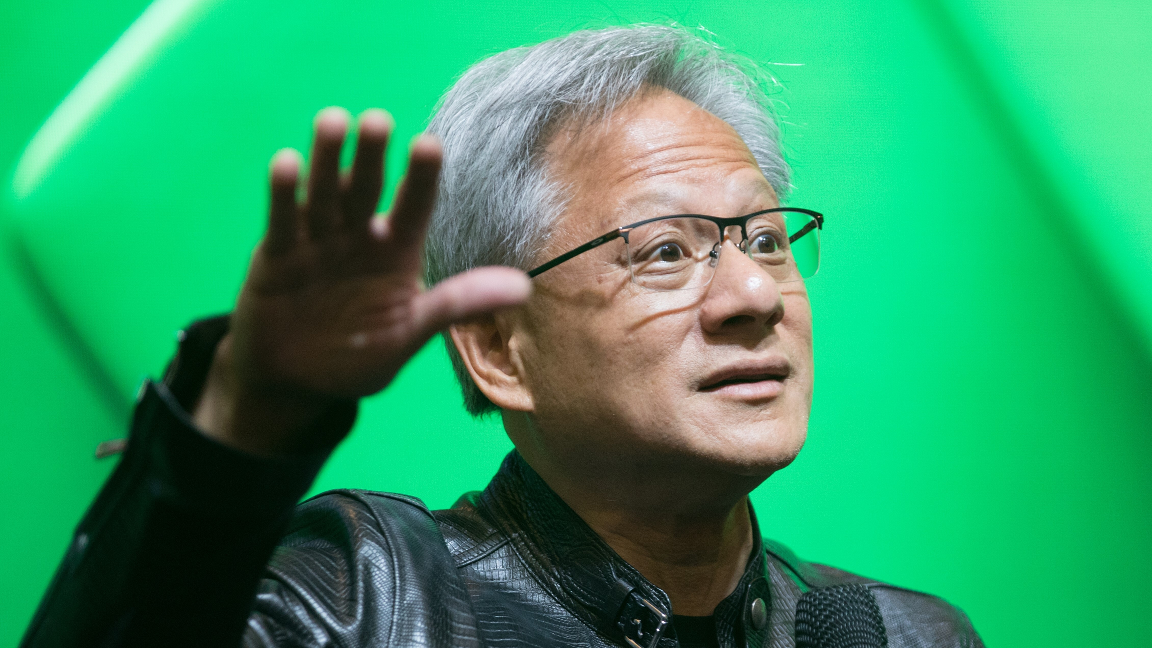Nvidia CEO Jensen Huang says U.S. ban on AI chip exports "a failure," says spread of U.S. chips vital to competitive advantage
Jensen Huang believes that the U.S. should diffuse its AI tech across the globe instead of stopping its rivals from getting it.

Nvidia CEO Jensen Huang said in an interview that the U.S.’s bans on AI chip exports are "a failure" and are having the exact opposite effect that the White House wants, in that it’s pushing its Chinese rivals like Huawei to innovate and build AI hardware that could compete against its offerings. According to the Financial Times, the chief executive of one of the most valuable companies in the world is criticizing Washington, D.C.’s ban on the Nvidia H20, which it specifically built for China.
Huang said that Nvidia had a 95% market share in China in early 2021, at the start of the Biden administration. But today, it has already dropped to just 50% — an effect of the various bans and sanctions that both the Biden and Trump governments have applied to China. However, this does not mean that China’s AI industry is shrinking. Instead, many companies are turning to Nvidia’s Chinese competitors.
Many of these companies still haven’t matched Nvidia’s technology, but they’re quickly catching up, especially as China realized that its reliance on American technology means that it can be cut off anytime. That’s why Beijing and several other Chinese institutions are supercharging their investments in AI chips. Aside from that, some of the biggest Chinese tech companies, like Tencent and Alibaba, have started purchasing locally produced AI tech, which is further fueling research and development of Chinese chip makers.
“The idea of AI diffusion limiting other countries' access [to] American technology is a mission expressed exactly wrong,” Huang said in an interview with Stratechery. “It should be about accelerating the adoption of American technology everywhere before it’s too late. If the goal is for America to lead, then AI diffusion did exactly the opposite of that.”
Former Commerce Secretary Gina Raimondo seemingly agrees with Huang. She was previously quoted as saying that holding back China’s progress through bans and sanctions is a fool’s errand, and that investments in semiconductor manufacturing, research, and innovation should matter more.
Aside from being ineffective, Huang also said that the H20 ban will not just cost Nvidia, but it will also mean that the U.S. will miss out on a lot of taxes. “Its costs are enormously costly. Not only am I losing $5.5 billion — we wrote off $5.5 billion — we walked away from $15 billion of sales, and probably — what is it? — $3 billion worth of taxes,” said the Nvidia CEO. “The China market is about $50 billion a year, and it’s not $50 million, it’s $50 billion. $50 billion is like Boeing, not the plane, the whole company. To leave that behind so that the profits that go with that, the scale that goes with that, the ecosystem building that goes with that —." The loss of that massive ecosystem is the biggest threat to CUDA in the long run.
Follow Tom's Hardware on Google News to get our up-to-date news, analysis, and reviews in your feeds. Make sure to click the Follow button.
Get Tom's Hardware's best news and in-depth reviews, straight to your inbox.

Jowi Morales is a tech enthusiast with years of experience working in the industry. He’s been writing with several tech publications since 2021, where he’s been interested in tech hardware and consumer electronics.
-
atmapuri This is no surprise. The China has become a giant safe haven for all startups, where NVIDIA (and other companies affected by tariffs) cant compete against them thus allowing unhinged growth and development of competition, which could soon enter other world markets and not remain limited only to China.Reply -
kyzarvs In other news, competition is a good thing and drives down prices...Reply
If an unintended consequence of the current shenanigans is that it allows another tech giant to quickly play catchup and then compete globally - sounds good to me, even if Jensen might need to cut down his leather jacket consumption slightly... -
christopher.andrew.carr Jensen Huang has the biggest, most obvious ulterior motive imaginable. He just wants to sell GPUs to China -- national security be damned. He's full of sh*t.Reply
And this comment section will no doubt full up with wumao nonsense.